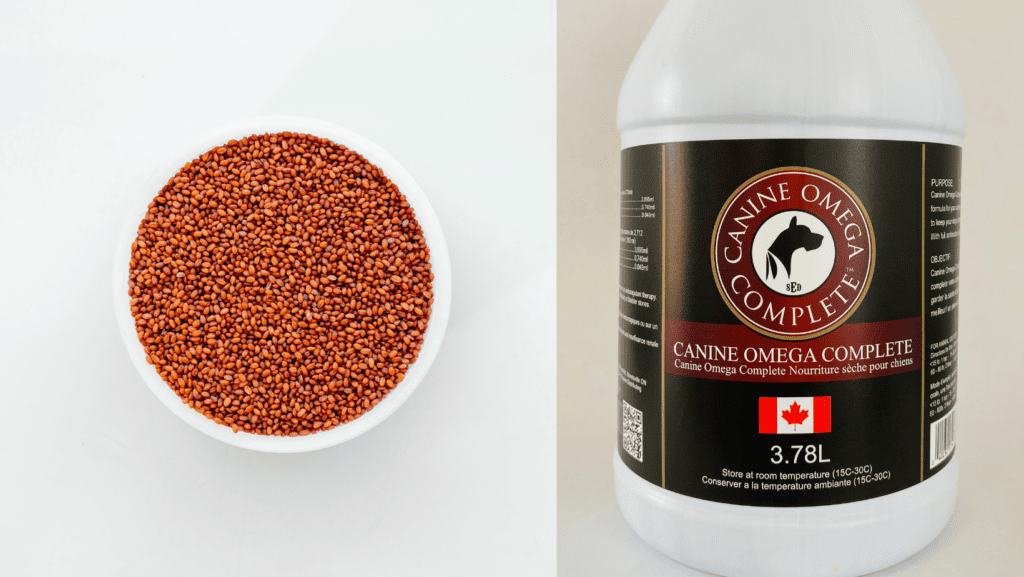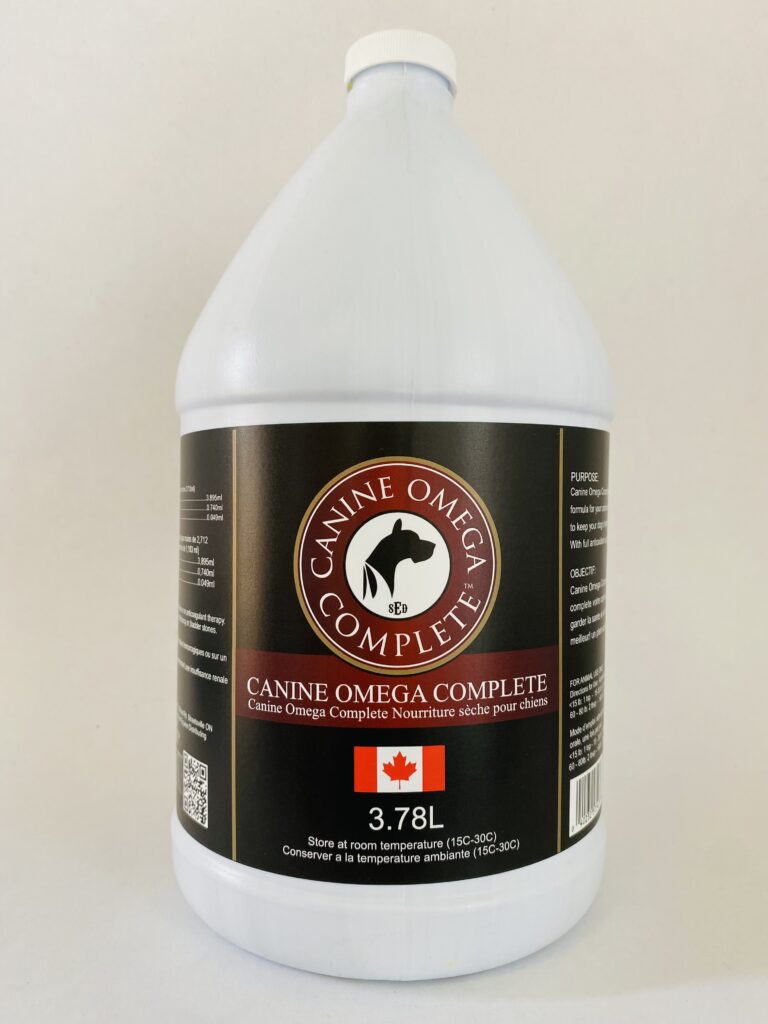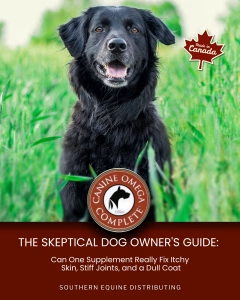Introduction to Camelina Oil for Dogs
Dog owners are always on the lookout for effective and reliable supplements that support their companion’s overall health. One product that has garnered attention for its potential health benefits for dogs is camelina oil. But how effective is camelina oil, really? And how does it compare to our own Canine Omega Complete?
Both supplements are known for their omega-3 fatty acid content but differ in various aspects that may influence their impact on canine health. In this article, we will delve into the properties, benefits, and unique features of camelina oil and Canine Omega Complete, helping pet owners decide which supplement may be the best fit for their canine’s specific needs.

What is Camelina Oil?
Camelina oil, also known as gold-of-pleasure or false flax, is a natural oil derived from the seeds of the Camelina sativa plant. This plant belongs to the Brassicaceae family, including well-known members like mustard and canola. Camelina has been cultivated for centuries and has a rich history of use as a food source and an oilseed crop.
The Camelina sativa plant is known for its hardiness and adaptability, making it suitable for growth in various climates. It thrives in cooler regions and is often grown in northern parts of Europe, North America, and Asia. The plant is known for its vibrant yellow flowers and produces small, teardrop-shaped seeds rich in oil.
Camelina oil has gained popularity as a nutritional supplement for humans and animals, including dogs. It is often advertised as an excellent source of omega-3, as it contains a notable amount of alpha-linolenic acid (ALA); however, not all omega-3 fatty acids are the same – more on that in a minute.
In addition to its omega-3 content, camelina oil is also a source of vitamin E, an antioxidant that helps protect the body’s cells from damage caused by harmful free radicals. Vitamin E is essential for maintaining healthy skin, supporting the immune system, and promoting overall well-being.
What is Canine Omega Complete?
Canine Omega Complete® is an all-natural liquid supplement specifically formulated to enhance the health and well-being of dogs. Its patented blend of wild-caught fish oil, non-GMO soybean oil, cranberry seed oil, and human-grade all-natural vitamin E provides essential nutrients that support a dog’s overall health.
At the core of Canine Omega Complete® is its rich omega-3 fatty acids, alpha-linolenic acid (ALA), eicosapentaenoic acid (EPA) and docosahexaenoic acid (DHA). This combination of short-chain and long-chain omega-3s play vital roles in promoting various aspects of a dog’s health, from maintaining a lustrous coat and reducing itching to supporting joint mobility and function.
Aside from EPA and DHA, Canine Omega Complete® also includes Cranberry Seed Oil, a nutritional powerhouse derived from the seeds of the cranberry (Vaccinium macrocarpon) fruit. Cranberry Seed Oil is rich in various beneficial compounds that contribute to its significant health-promoting properties for dogs.
To complement its omega-3 fatty acids, Canine Omega Complete® also includes expeller-pressed soybean oil. This nutritious oil provides a rich supply of linoleic acid, a specific type of omega-6 fatty acid that supports proper cell membrane function, healthy skin and coat, and various physiological processes in horses and dogs.
A comparison of camelina oil for dogs and Canine Omega Complete
Omega-3 Content
Omega-3s are essential nutrients that occur in different forms: ALA, EPA, and DHA.
Whereas camelina oil is a source of ALA, Canine Omega Complete is a source of ALA, EPA, and DHA. Here’s why that matters:
While alpha-linoleic acid (ALA) is an essential omega-3, it is a precursor to eicosapentaenoic acid (EPA) and docosahexaenoic acid (DHA), which are also essential for various physiological processes in dogs, including reducing inflammation, supporting immune function, and promoting healthy skin and coat.
EPA is renowned for its anti-inflammatory properties, which can be particularly beneficial for dogs dealing with joint pain, allergies, or skin conditions. By modulating the body’s inflammatory responses, EPA helps reduce inflammation, relieves discomfort and supports the body’s natural healing processes.
DHA is another critical omega-3 fatty acid with significant cognitive benefits. It plays a crucial role in brain health and development, making it essential for young puppies and aging dogs. DHA supports cognitive function, memory, and learning capabilities, which can be particularly beneficial for training and overall mental acuity in dogs.
However, the conversion of ALA to EPA and DHA in the body is limited; research shows that the overall conversion rate of ALA to EPA is approximately 10%, and the conversion to DHA is even lower, at less than 0.1%. Direct supplementation is much more effective and should be preferred for maximum benefits.
The winner: Canine Omega Complete
Canine Omega Complete offers the same results as camelina oil but with more direct and potent supplementation of essential fatty acids. The cranberry seed oil is a source of ALA, and the fish oil serves omega-3 in their converted forms, EPA and DHA. The result: maximum uptake and related benefits from short- and long-chain omega-3s. This combination of essential nutrients makes Canine Omega Complete a top choice for dog owners who want direct and efficient results.

Supplement Format
As with Canine Omega Complete, dog supplements that contain camelina oil are often in liquid form. The product is added to the dog’s food once or twice a day, depending on the feeding instructions, making it quick and easy to supplement your dog with essential nutrients.
The winner: tie
Products that include camelina oil and Canine Omega Complete are liquid supplements that often have better absorption rates, ensuring that your dog receives the maximum benefit from the essential nutrients.
Health Benefits
Companies that manufacture and sell camelina oil for dogs often point to improved coat condition, reduced allergic reactions, improved digestion, and reduced inflammation causing discomfort in joints; however, these results are not unique to camelina oil. The same benefits are reported in products containing the converted forms of omega-3 DHA and EPA, meaning that the benefits of these products are similar, and the overall quality is much higher.
While dogs need different forms of omega fatty acids, it is a well-known fact that dogs specifically need EPA and DHA to experience the benefits omega-3. As the authors at Canine Arthritis Resources and Education (CARE) observe:
Dogs specifically need EPA and DHA to decrease inflammation due to arthritis. The most potent source of EPA and DHA is fish oil. You can provide EPA and DHA by giving fish oil supplements, whole fish (anchovies, sardines), or feeding a prescription food that contains high levels of fish oil.
The winner: Canine Omega Complete
As mentioned above, Canine Omega Complete contains the precursor and converted forms of omega-3s that directly benefit canine health, including promoting healthy joints, reducing inflammation, and supporting overall joint mobility.
Further Reading
- Effects of cranberry extract on prevention of urinary tract infection in dogs and on adhesion of Escherichia coli to Madin-Darby canine kidney cells
- Cranberry Seed Oil for Canine Health

Scientific Research
There have been no studies on the efficacy of camelina oil for dogs, but there have been studies on flaxseed oil for dogs, which is another source for ALA. These studies have found that, while the ALA in flaxseed may contribute to improved skin and serum inflammatory responses in dogs, it is not as powerful as fish oil. VCA Canada has also stated that ALA is not converted efficiency and does not work as well as fish oil to treat inflammatory diseases.
While ALA can be converted to DHA and EPA (the most effective anti-inflammatory omega-3 fatty acids), cats and dogs do not convert this efficiently. Therefore, the anti-inflammatory effects of flaxseed oil are not as powerful as fish oil. Limited studies in animals have been performed, but there is evidence that flaxseed oil does not work as well as fish oil to treat inflammatory diseases; higher doses may be needed to achieve an effect.
Further Reading
The winner: Canine Omega Complete
Studies on ALA have shown that it is not an efficient source of essential fatty acids.
Many products that contain camelina oil often stress that ALA is an essential nutrient, and this is true; however, simply feeding ALA alone is not a well-rounded, balanced supplement. Feeding ALA without the converted, required nutrients EPA and DHA is like buying car tires when you don’t have a car – the tires are essential, but the rest of the car is, too!
Canine Omega Complete’s patented blend provides ALA, EPA, and DHA in a balanced ratio, meaning it is a well-rounded source of essential nutrients.
The Overall Winner: Canine Omega Complete
Choosing the right supplement for your canine’s health is an important decision, and understanding the unique properties of each option is key. While camelina oil and Canine Omega Complete offer dogs omega-3 fatty acids and vitamin E, Canine Omega Complete stands out for its direct active sources of essential nutrients.
One of the notable advantages of Canine Omega Complete® is its versatility in addressing various canine health concerns. Whether your dog needs joint support, improved coat condition, or relief from allergies and itching, this comprehensive supplement can cater to their unique needs.
The ingredients found in Canine Omega Complete® are high-quality, human-grade and supported by scientific research and positive testimonials from pet owners and veterinarians alike. Canine Omega Complete gives pet owners peace of mind that they are giving their furry companions the best supplement in the most potent form, backed by research and results.
Southern Equine Distributing
If you are located in Canada or the United States, and are looking to keep your dog(s) as healthy as possible, then feel free to reach out to Southern Equine Distributing today, and find out for yourself just how beneficial these supplements are.







